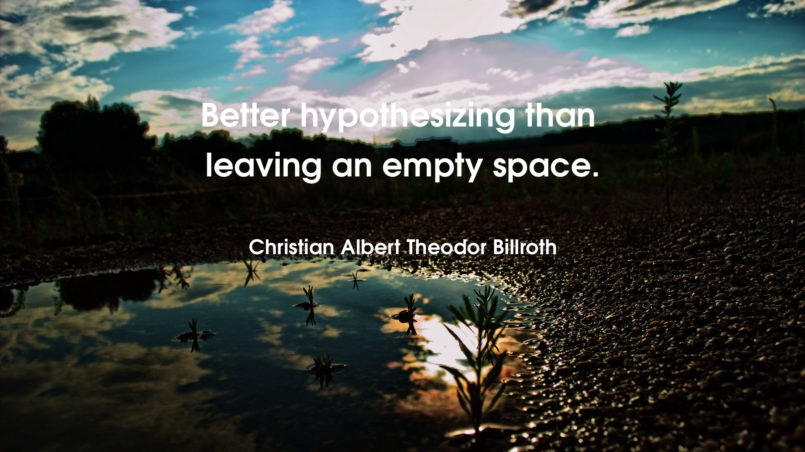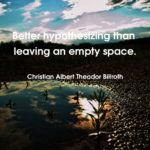Do you really know what’s going on?

In the previous article, I extensively spoke about the risk of losing oneself in a construct of self betrayal, and how much better it would be to ask experts for their opinions in order to unearth the complete truth.
There is one further step you could take, to bring light into a conflict-ladden situation: by hypothesizing, by speculating. Logically, these are statements which might be true – but don’t have to be. So you are moving towards the realm of probabilities. Hypothesis are very important for later theories, which will eventually become scientifically durable.
Hypothesis/assumptions in newspapers
Crying ‘outrage’ about the news printed in the papers, I find inappropriate – case in point: the flood of hysterical, jugdmental words swamping social media in the wake of the attack and amok incidents recently happening within Europe. When the sex or religion of an alleged delinquent were mentioned in newspaper reports, readers and “haters” on Facebook immediately assumed that the newspaper was creating “hate propaganda”, respectively engaging in discriminatory and biased reporting. But what had actually happened was merely, that on-the-go statements by police and criminologists, who were just giving their first assessments and views, were taken. We, the people, wish to be informed quickly after all! I do not see that the rapidity of information spread via social media (Facebook/Twitter) constitutes the problem, but rather the way readers then handle the given information.
What I wish to say is, that we can certainly be asked to assume responsibility for our choice of sources and contents as well as for how quickly we then interpretate this as our truth.
One thing should be clear to us all …
The experts’ first assumptions made about certain incidents right on scene, cannot constitute the complete truth. Which means that, at any rate, we will be getting more and better data the next morning, the next week, and the complete truth or the closest thing to it, can only be known at a much later time.
This is why it is very much important to have stamina as well as patience when reading and thinking. Have we gotten much too short of breath, perhaps? Rome, after all, was not built in a day, and we cannot expect the truth to be in the bag quite so fast, either – within one hour or less, it’s just not possible to get there. Even if we are tremendously touched by the incidents going on around the world and the big bad issues which are now happening so close, in Europe, and which are causing a lot of emotions, feelings and empathy for the victims, it would be more clever if we did not cry out severe accusations (f.i. toward the police, the politicians) via Facebook or Twitter, without even having thought about the true content of one’s own statements; especially not on the very next day after things have happened. It is high time not to pass the buck too quickly – which only causes hysteria while conveniently calming our own conscience. Let us better stick to the facts:
Facts
How can you be your best own personal manager in looking for the truth? First, ask yourself the following questions:
- What has happened?
- How did it happen?
- When did it happen?
- To whom did it happen?
- Where did it happen?
- Why did it happen?
- Who did it?
Anyone able to answer those 7 questions by using several reliable sources, and remaining as neutral as possible, is already quite close to the solution. But, to be honest, we are oftentimes not really able to act as neutrally as we’d like to:
Our personal hypothesis are “our” hypothesis – not experts’ assessments
While experts do have an enormous wealth of experience and knowledge we only wish we had – let us stick to the examples of the terror attacks and amok incidents here – we are merely playing psychologist and detective at the same time, unable to provide more than our own limited quantity of experience: We habitually observe people and groups of persons, think about their personalities and behaviours (resulting in generalizations which are always just reflections of your own little experiences), combine with that their styles of clothing, their language, their facial expressions and movements, thus never leaving our own quite small world of perception. This is called formulating hypothesis on a daily life basis. Hypothesis of daily life are useful if they concern ordinary matters like sun burn, the weather or nutrition. So, while based solely on everyday occurences, they can in fact serve to protect you from dangers and to live a better and healthier life, when basing your small decisions on such experiences and projections.
But they become plainly useless when we are in the middle of unusual crisis – meaning that you, therefore, cannot count on your own experiences anymore. So if we do not question our own perception critically, we might not be able to notice, for instance, what is going on with your neighbour, that kids are hidden in the cellar, or a whole family is getting violated by one sole delinquent. Being able to even conceive this, might lay well beyound our horizon of imagination. If it is far from your to ever act like such a criminal – how could it be easy for you to comprehend and understand the deeds of such a horrifying perpetrator? That is why we tend to ignore or missinterpretate clear signals of danger.
Do you know your neighbour?
Are we attentive enough when we hear, for instance, unusually persistant crying of a kid? Do we tend to ignore it? Do we perceive what is going on in our immediate enviroment? We are well able to raise our own awareness und to listen and watch. So we want to change the world? Well, then let’s please start small, let’s mingle, let’s ask your neighbours how they are doing – especially when there are occasions when things don’t feel right (like when your neighbour has not left the house for a long time, or when the light is continuously on in his flat). It is quite possible that a neighbour does not feel good, and we might just be too spoiled and ignore it – cause we ourselves are fine, after all.
“That’s none of my business!”
I truly find this attitude antisocial – and please keep in mind: Would you really want somebody else thinking about you so dismissively? Oh dear, we are crying our eyeballs out when watching TV, deeply concerned with the whole world’s sorrow? There, we selfrighteously feel entitled to mingle – from the distance, in search of the big delinquent, while our direct environment seems not to be facable to us … If I was being harsh now, I’d say: These are solely everyday hypocrisies, no more.
A person who does not care about their neighbourhood is not to be taken seriously when pretending to suffer from all the terrible events in the rest of the world.
Dangerous misinterpretations
The fact that we are partially not able to understand the danger rising up or already existing in our own environment, seems to result from us simply misinterpreting the signals of a certain danger. I once read about an incident where a woman was killed – a true criminal case – and was crying shrill and loud death wails for a long period of time, while a bypasser interpretated these signals of danger totally wrong: He was thinking only of his own experience, telling the police that he had thought the woman to be suffering from colic pain only. This crying just reminded him of this one single possiblity – and he did not assume the woman to be in danger at all.
So from lack of life experience, it surely happens that explanations for causes are gotten completely wrong. What is happenening there, is an automatic mental connection between our own perception and personal experiences. Our first thoughts are simply guided by our own schemata. Logically, stereotypical thinking leads to faulty hypothesis being shaped and a fictitious social reality being created, with – very often – dramatic consequences.
So if the guy had been self-critical about his own thoughts, he might have also considered other facts to be important: f.i. the unusual time of the cries.
“We did not expect that anybody was in danger.”
This assumption is heard very often when crime experts look for useful witness statements. If the man had discussed his observations with experts, they would have assumed immediate danger and would have reacted completely different than him.
So, it is important to do a so-called complete conditions check and to ask yourself: “Is there something wrong?”
The creative process of building hypothesis must be practiced frequently and intensively – the ability of coming to solutions, must be developed. People normally do not have sophisticated and empiracally substantiated methods available for that.
And this shortcoming might be the main reason that we get it wrong so often in daily issues and make totally poor decisions even more freuqently. We seem to be unaware of the fact just how long the chronicals of human deficiency are.
To be continued alas, in the next article – it remains an exciting topic, dear friends! 🙂
Yours – always passionately trying to find the truth -,
Anna D.
Credits
| Image | Title | Author | License |
|---|---|---|---|
 |
better-hypothesizing-than-leaving-an-empty-space | Patryk Kopaczynski | CC BY-SA 4.0 |
